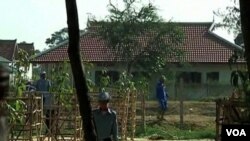PHNOM PENH —
Hundreds of prisoners across Cambodia are forced to remain in custody in Phnom Penh, where they had to pay bribes in order to be transferred after their cases are appealed in the capital, a new report finds.
Authorities claim they don’t have the money for fuel or staff to move prisoners from the capital, where all appeals are heard. But officials at the rights group Licadho say the practice is illegal, and the government’s prisons are required to transport prisoners to and from trial.
In its report, “In Absentia 2013,” Licadho found hundreds of prisoners were being transported for their appeals and then asked for bribes between $200 and $300 for transport back to their home provinces.
“It is the government’s duty to bring detainees to their own trials and bring them back free of charge,” Naly Pilorge, Licadho’s director, said. “Any payment is illegal. And we have seen that if prisoners do not go to their hearing, there’s good chance that the verdict is not so good. It’s a better outcome for them if they can defend themselves.”
Prisoners not returned to their home provinces are then separated from their families, the report found. That increased a burden on prisoners already facing poor food and accommodation.
Such problems led to many inmates abandoning the appeals process. Only about one in 10 cases make it to the Court of Appeals, the report found.
Meanwhile, those who are kept in prison are often not given skills to help them adjust on their release, Licadho said. This worsens their odds of successful reintegration.
Kuy Bunsorn, general director of the Ministry of Interior’s prison department, could not be reached for comment Wednesday. But one official at the department, speaking on condition of anonymity, said money asked of prisoners goes to fuel and other transportation costs for their transfer.
“This is not a government policy, demanding them to pay, but after we transfer them to Phnom Penh and then back to their provinces, we don’t have gasoline for that, as many of them stay in remote provinces such as Siem Reap and Preah Vihear,” the official said. “Thus when they want to return to their provinces, they need to help cover gasoline, but in principle there is no such requirement.”
The government for its part has tried to improve the transport of prisoners. In 2012, 619 prisoners were successfully transferred from provincial prisons for their appeal cases in the capital. But Licadho says progress has been slow and is recommending the construction of regional appeals courts and video conferencing to improve the situation.
Authorities claim they don’t have the money for fuel or staff to move prisoners from the capital, where all appeals are heard. But officials at the rights group Licadho say the practice is illegal, and the government’s prisons are required to transport prisoners to and from trial.
In its report, “In Absentia 2013,” Licadho found hundreds of prisoners were being transported for their appeals and then asked for bribes between $200 and $300 for transport back to their home provinces.
“It is the government’s duty to bring detainees to their own trials and bring them back free of charge,” Naly Pilorge, Licadho’s director, said. “Any payment is illegal. And we have seen that if prisoners do not go to their hearing, there’s good chance that the verdict is not so good. It’s a better outcome for them if they can defend themselves.”
Prisoners not returned to their home provinces are then separated from their families, the report found. That increased a burden on prisoners already facing poor food and accommodation.
Such problems led to many inmates abandoning the appeals process. Only about one in 10 cases make it to the Court of Appeals, the report found.
Meanwhile, those who are kept in prison are often not given skills to help them adjust on their release, Licadho said. This worsens their odds of successful reintegration.
Kuy Bunsorn, general director of the Ministry of Interior’s prison department, could not be reached for comment Wednesday. But one official at the department, speaking on condition of anonymity, said money asked of prisoners goes to fuel and other transportation costs for their transfer.
“This is not a government policy, demanding them to pay, but after we transfer them to Phnom Penh and then back to their provinces, we don’t have gasoline for that, as many of them stay in remote provinces such as Siem Reap and Preah Vihear,” the official said. “Thus when they want to return to their provinces, they need to help cover gasoline, but in principle there is no such requirement.”
The government for its part has tried to improve the transport of prisoners. In 2012, 619 prisoners were successfully transferred from provincial prisons for their appeal cases in the capital. But Licadho says progress has been slow and is recommending the construction of regional appeals courts and video conferencing to improve the situation.









